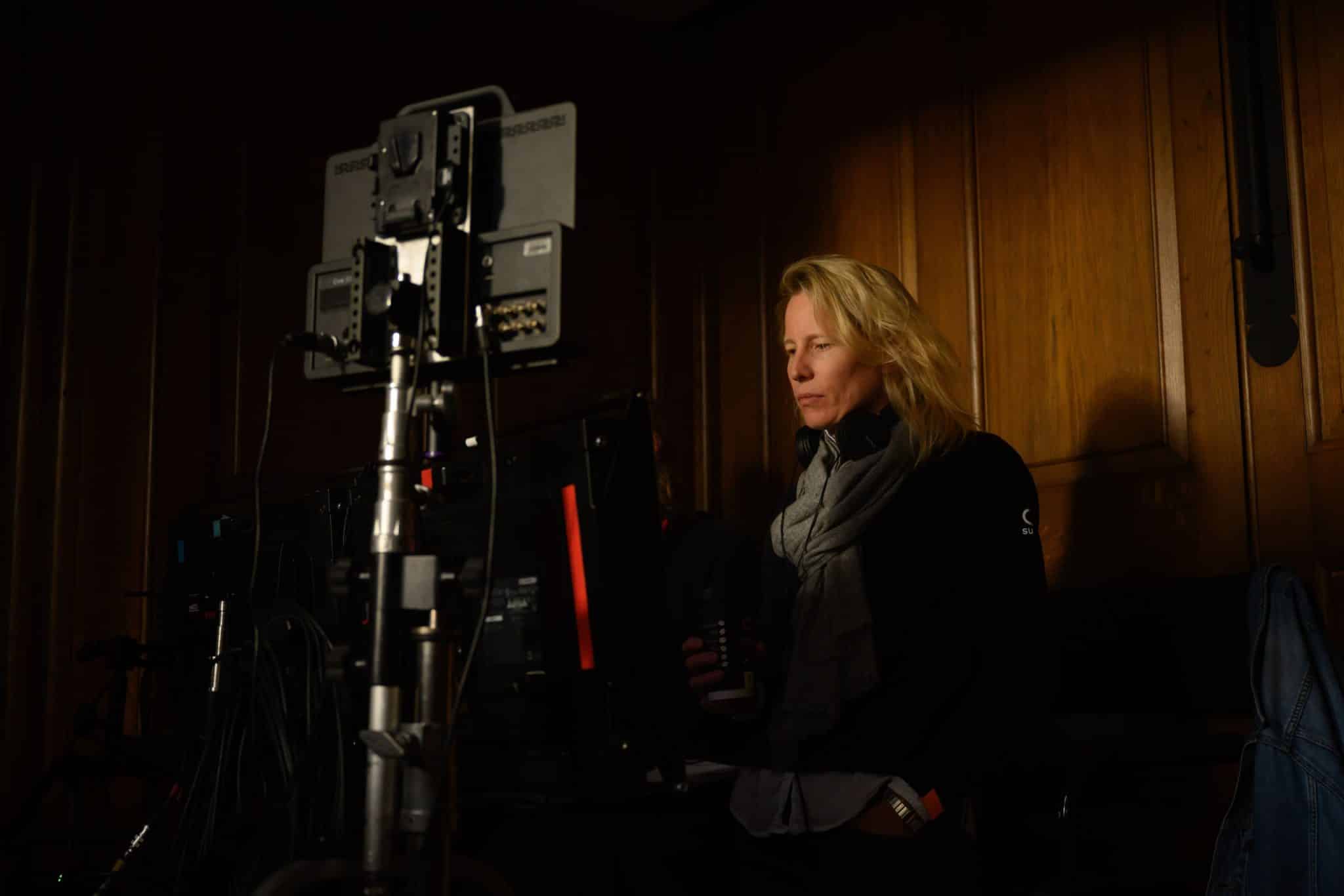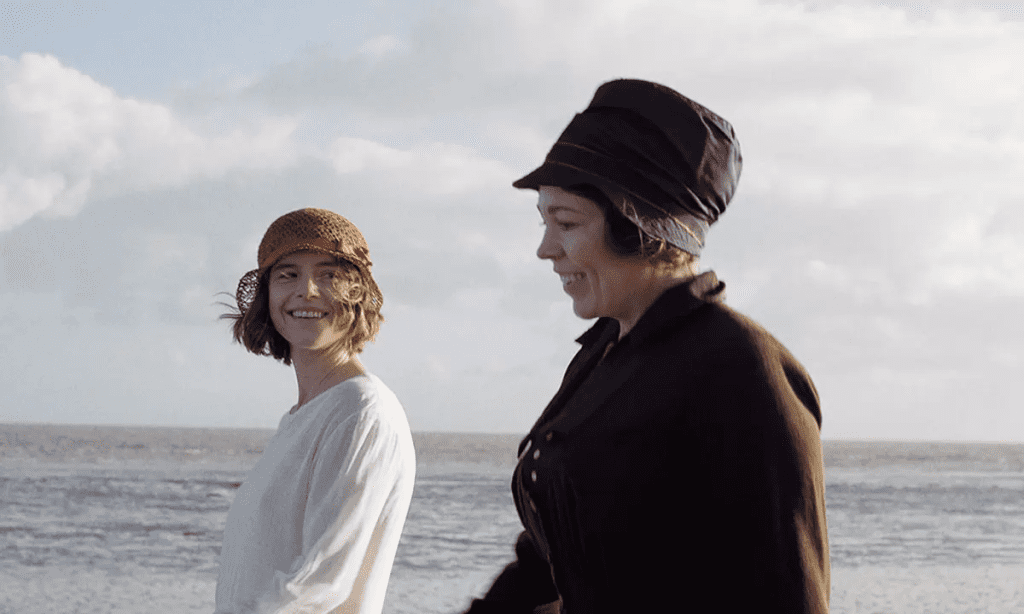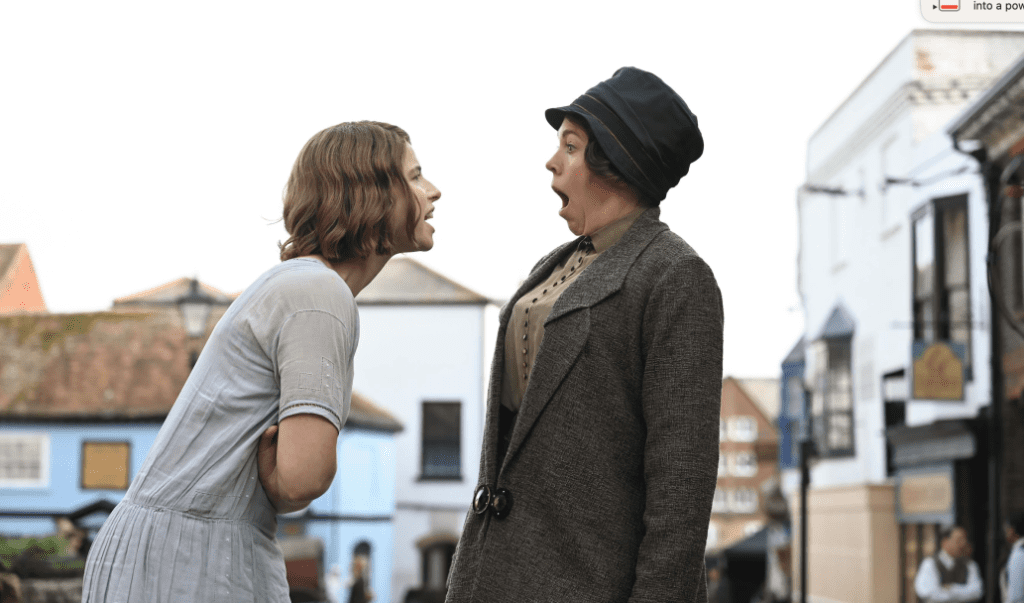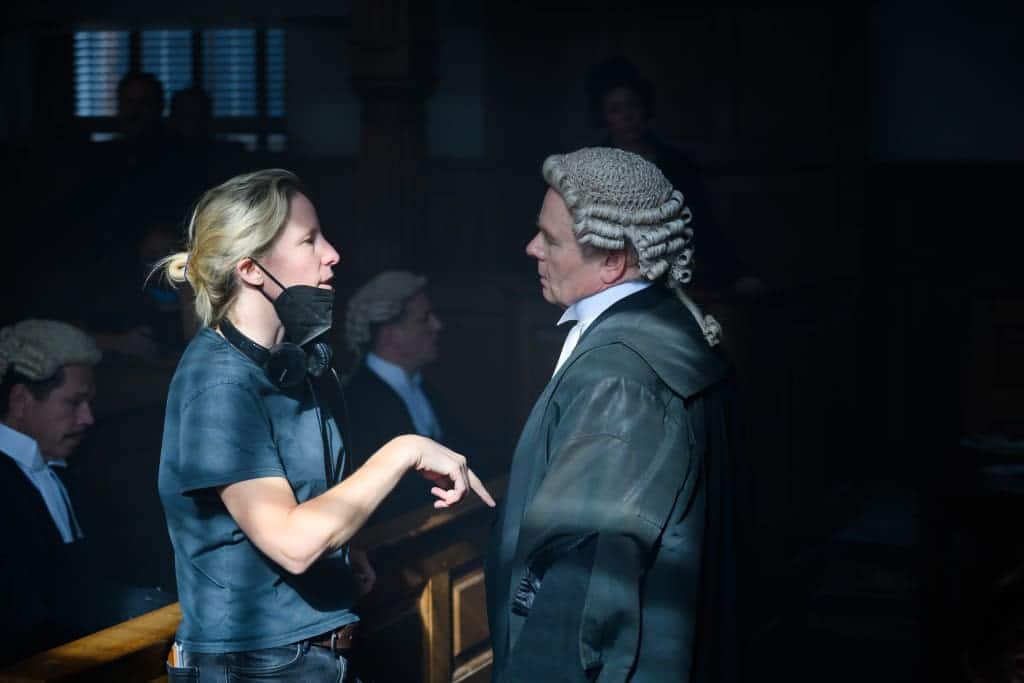
In British director Thea Sharrock’s charmingly crude Wicked Little Letters, we see two of British cinema’s most dynamic actors go up against each other in a battle of potty mouths and poison-tipped pens.
Olivia Colman and Jessie Buckley play Edith Swan and Rose Gooding, two women living next door to each other in Littlehampton, a small seaside town in England. Swan (Coleman) lives a repressed existence under her domineering father, while Rose (Buckley) is a free-spirited single mother who has somewhat liberated herself from the social norms of the time. Though the two begin as friends, their friendship is upended when Rose is accused of sending hate-mail to several townspeople, including Swan…
We sat down with Sharrock to discuss the making of the film, casting Colman and Buckley as her leads, and how directing movies differs from theatre.
Luke Georgiades: What first compelled you to make this into a movie?
Thea Sharrock: Mainly it was in the hopes that you were going to like it [laughs]. I was really intrigued by the screenplay because it felt like a fresh voice that I hadn’t come across before. It was laugh out loud funny, but my instinct was that the complexity of the women at the heart of the story was going to be an absolute joy to unravel. Who these women are, why they behave the way they do, why they have the relationships they do.
A lot of people have asked if I think the film is ultimately about female emancipation. Someone suggested to me that it might be to do with mental emancipation, which…oof. Sometimes these words seem clunky and heavy, and make it feel almost like it’s a political piece, which it absolutely isn’t. I think what I love about it is that it’s about human beings. But inevitably, when human beings as well as this screenplay observes them, you find yourself involved in something that’s one-minute laugh out loud, and another incredibly poignant and moving in a way that you didn’t anticipate. I think that’s pretty unique. I also couldn’t get my head around the fact that it was based on a true story. It’s bonkers. Absolutely bonkers. I’m delighted we found a way to retell a story that absolutely deserves to be told, but always with an eye for entertainment.

LG: Olivia and Jessie’s characters almost have this begrudging respect for each other by the end. Or, at the very least, an understanding.
TS: “I wish it wasn’t you.” I think that’s the most important moment in the whole film, and I think she absolutely means that. She was doing it for herself. But it had to be Jessie’s character, or else Olivia’s character wouldn’t have been moved into seeing the world in a different way, and that’s what they give to each other. They both think that the other represents something really important that they need to understand about the world and women’s place in the world. It’s brilliant to watch them navigate their way through what that means in that moment in time, in Post-war Britain.
LG: How did you end up casting Olivia and Jessie? Did they immediately come to mind as you were reading the script?
TS: Olivia was already on the project when it came to me, and Johnny definitely had her in mind when he was writing the character of Edith. Reading the script in her voice not only made the text funnier, but it also made an incredibly complex character make sense to me.
Both Olivia and I immediately thought of Jessie. I didn’t know that they were great friends, so Olivia had the epiphany to offer it to her. As soon as we sent her the script, she just responded so positively to it. She loved the comedy, which is something new for her. We moved heaven and earth to make all our dates work simultaneously.

LG: Watching Olivia and Jessie go toe to toe is this miracle or cinema. Was there much room for improvisation on set?
TS: With me, there’s always room. I’m a huge advocate for improvisation, when an actor’s in the right place and wants a moment to find their own voice within a scene. But with this, between myself, Johnny and the cast, we chose the words so carefully beforehand that there were surprisingly few moments of improvisation on the set. It was a real sign of respect—everyone came on because they loved the script and they loved the dialogue, and the sparsity of it. Swearing is such a massive component of the script itself—it’s almost a character within itself—so for that reason we had to be really careful. The swearing that was chosen was very carefully plotted throughout the film. It would have been inappropriate to throw in another load of swear words here, there and everywhere…it would have affected the quality of when it is used. The idea was based on these true letters, and the majority of the letters used in the film were really written, they were of the women of the period. When you have that as your starting place, it makes it even more important to be true to the real source.
LG: Have you read those original letters?
TS: I’ve read them, I’ve seen the handwriting. So much of the dialogue in the film was verbatim to what was being written in those letters. 80% of the letters in the film were real dialogue of what was written a hundred years ago. It’s totally British.
LG: So much of the film boils down to its Britishness.
TS: When you get films that are set, like this, a century in the past, often at its root is a story about class. By which I mean you’re pitching one class up against another. That’s not what this is about. But because it is so innately British, each character is steeped within the reality of the class system. And that’s what I think makes it so uniquely British. That’s where I would question whether it would work so well if you were to transpose it to another nationality.

LG: Why was it important to make Jessie’s character Irish?
TS: Jessie’s character wasn’t originally Irish, but after casting her I decided I wanted her to be Irish, and I wanted to work with Jessie there to explore the turns of phrase that we could use to really deepen the character and emphasise her dialogue in a rhythmic way. Jessie’s an extraordinary chameleon, and she’s already created, not only so many characters on stage and screen, but often they have an accent. They’re so removed from her natural self. There was something about Rose as a natural outsider within this very typically Southern English village, that I thought by making her Irish it would up the ante even more, in terms of her status.
LG: Were there any films you looked to for inspiration?
TS: I spent a lot of time with our DP swapping everything from a single frame of a movie to the general atmosphere of one. Kes was one of the first films that we turned to. The way it’s shot, the way that it’s designed, the look, the use of colour, was very important to the making of Wicked Little Letters. Sometimes it will be a single frame of a movie that triggers your imagination or will bring you clarity. That world building is the bit that I love—it allows everybody in unison to come to an understanding of what we’re trying to achieve together.
LG: What is it about the filmmaking experience that keeps you coming back? Does it scratch a certain itch for you that theatre can’t?
TS: If I could have it my way I would do them equally. One takes a lot longer than the other, and they’re deeply incompatible in terms of your diary. With theatre, you’re booked well in advance and the dates never move, and with film you can have something in development for ages and then suddenly it’s a go at full speed. It’s immediate. I had a spell of theatre for ten years, then I got into TV and film, and now I’ve done a bit more of that, and now I’m looking forward very soon to returning to theatre when it feels right.

LG: How has your work in theatre informed your filmmaking?
TS: On this film it was a necessity that I had the writer very close to me, on set, every step of the way. In theatre, it’s an absolute given that, whether they’re alive or dead, the writer is the most important person in the room. The alliance between a director and a writer is unbeatable. But it’s not a given in film. The other thing is my relationship with the actors. My job is to be a facilitator—I want to bring out the best in the script and the best in my actors and It’s my job to bring those two things together. Each actor has their own unique journey to a character, they learn from every project they do, and they rarely walk the same path twice. I love recognising that each actor needs something different, something unique, and needs a certain type of nourishment and care in order for them to be free and safe and to try things.
Comedy, especially, is a craft in and of itself. It’s the hardest thing to get right, and it takes a very big person to go for the joke, get it wrong, know that we need to go again, and be confident enough to do just that without carrying the weight of that failure. You also have a live audience, and what you learn from a live audience is everything. With film you’re constantly having to think about how the audience will receive your art at any given moment.
LG: Do you ever feel a sense of anxiety constantly having to remind yourself about that?
TS: Inevitably it’s there because that’s who you’re doing it for. I don’t make movies for myself, I make them for an audience. For me, the audience is in the present, and I carry them with me all the time. It’s the anxiety that drives me. That’s the adrenaline.
Wicked Little Letters is available to stream now.



